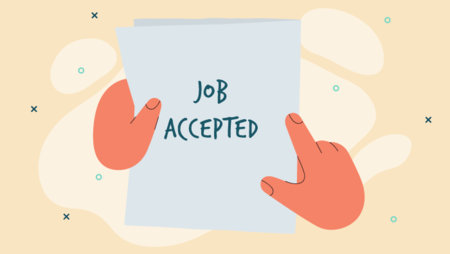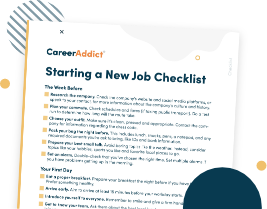 to write a job acceptance letter" />
to write a job acceptance letter" />You’ve been offered the job. Now what?! Check out how to write a job acceptance letter with this step-by-step guide.
 to write a job acceptance letter" />
to write a job acceptance letter" />
You've honed your CV, done your research and bossed the interview, and now, finally, you've received the email or letter containing those all-important words that your hard work have merited. You've landed your dream job and you're already planning your ascent to the top of the company, charming bosses and colleagues alike in a hailstorm of revolutionary ideas; before you crack open the champagne, though, there's the small but important matter of saying "yes" the role you've been offered.
The most professional course of action is to write to your new boss, formally accepting the role and perhaps returning any signed documents that are required. But what is the best way to do this while maintaining the good impression you’ve made so far?
Here’s a step-by-step guide on why you should write a job acceptance letter, what specifically to include, followed by a step-by-step process to do so. With our help, your acceptance letter is sure to be effective!
Landing your dream job is indeed the first step to your continued career success, but you need to keep up the momentum by writing a professional job acceptance letter. Best practice proves that accepting in writing is the best way to formally and officially accept any job offer, even if you’ve already verbally accepted the position.
Think of this acceptance letter as a way to flex those professional muscles, showing your employer the quality level of work to be expected from you all while confirming any idiosyncrasies in the offer at the same time. This is often your first non-interview contact with your employer, so make sure to spotlight your enthusiasm for the role and the organization as you accept!

When it comes to actually writing the letter, there are a few things you’ll want to include before you even start drafting it up. The letter should be comprehensive and clear to both you and the employer. Let’s look at a few necessary components of a job acceptance letter that will ensure clarity on all sides:

Now that you know what exactly to include in your exciting job acceptance letter, it’s time to put that into practice. Let’s review the tangible steps you should go through when writing a job acceptance letter to ensure optimal success.
If you have documents to return, a printed letter in a professional tone should accompany them, but if you’re accepting a job offer made on the phone (or itself via email), then a formal email in return is fine. The key word here, though, is formal: your new employers are not your pals just yet, so steer well clear of any LOLs, emojis and informal spellings. Keep things simple and professional at all times and avoid the tendency to ramble; your soon-to-be boss is essentially just looking for confirmation that you're accepting their offer, after all.
In even the briefest of letters, you should say thank you and make it clear you’re excited about the opportunity. It's also a formal indication of your willingness to accept their offer (just short of signing the contract), so you should be very direct and clear that that’s what you're doing. Aim for something along the lines of: "I am delighted to formally accept your offer of employment in the role of [position]."
You may have a long notice period before actually assuming your new position, so maintaining a positive impression is important, too. A more personal touch, such as thanking the interviewer for making you feel comfortable, is an excellent idea and reinforces the sentiment that you are trying to convey.
Your job acceptance letter is your chance to confirm important details regarding your acceptance of employment, such as the agreed salary, your department, position, supervisor and — most importantly, in this context — your start date. Summarize your understanding of the offer so that everybody is clear on the agreement being made, thereby avoiding any nasty surprises further down the road.
It is also the perfect place to ask any questions you may still have about the role or benefits of your new job — especially if you forgot to ask when prompted in the interview.
If you’re keen to get more information about your new role in advance, say so. Your new boss may be able to send you pertinent information you can start looking over during your notice period. Not only will you have given yourself a headstart when your first day comes around, but your boss will already be impressed by your enthusiasm and proactive attitude, too. Depending on the flexibility you have in your old job, there may even be training sessions or meetings you could be involved in before starting.
If you have a pre-booked holiday or vacation that you arranged months ago, then most employers will try to honor your plans. Many managers check this kind of thing during the interview, especially if they require someone to fill the role urgently, but if they haven't, then it is important to raise the issue quickly.
Nobody likes requesting time off before they've even accepted the position — let alone built up some goodwill in the job — but if your plans are unavoidable or can't be changed (i.e. an expensive holiday that includes flights, or an important event, such as your wedding), then you don't really have a choice. As long as you're respectful and polite in how you bring it up (don't start off with it, for instance, and enforce that the role is still your priority), then there shouldn't be an issue.
Besides, if your boss is unwilling to give you time off for your own wedding, then is that an organization that you particularly want to be a part of?
Having written your job acceptance letter, double check the details before hitting send (or print). The last thing you want is a professional communication that is littered with poor grammar or spelling errors. If you're meant to be returning other documents, check that all the information in them is correct and up to date (you don't want your new HR department to be on your case before you've even punched in) and, of course, don't forget to attach them, either.
As already mentioned, the important thing in this letter is to avoid making basic errors and tarnishing that great first impression that you made during the recruitment process. To re-iterate, the key errors to look out for are:
If you’re still unsure of where to start, or you need something to compare your own effort to, then we have included some sample templates for you. It's a good idea to write a draft and ask a friend or family member to review it before you send it, especially if this is your first job.
Final thoughts
Finally, all you have to do is send it; if you're mailing it, then ensure the address is correct (especially the department) and that it is a nice envelope. If possible, you might even hand it in personally, either to the manager in question or at the reception of your new offices.
Then all you have left to do is celebrate, before your next big writing task — writing your resignation letter!
ADDITIONAL READING
Have you ever had to write a job acceptance letter? What was the process like? Let us know in the comments section below.